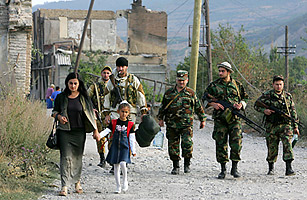
South Ossetian soldiers and local residents walk along a dirt road in Tskhinvali on September 5, 2008.
Rusuldana Doguzova, 75, stands crying in the second floor entrance of her brick house. Above her, the sun shines through a latticework of broken boards that was once the roof and onto a dust-covered china closet. During last month's battle for control of Tskhinvali, capital of the breakaway Georgian Republic of South Ossetia, a rocket crashed into the house Doguzova shares with her sister, spraying lines of shrapnel down the living room wall. A second rocket blew up in the garden, gouging the earth and knocking down trees. Beyond the garden fence, a concrete apartment building was burnt out after the fighting. "If the Russians hadn't come, we would have been wiped out," she says.
Tensions between South Ossetia, which Moscow now recognizes as independent, and Georgia, which says the enclave is still part of its sovereign territory, remain high. To show its solidarity with South Ossetia, and to create facts on the ground that will be hard to change, Moscow is quickly pouring money into patching up Tskhinvali. Close to the center of the capital, dark green army trucks grind up and down the grid of streets carrying construction supplies. "Volunteer" youth brigades from Russia and men in the orange beret of the Ministry of Disaster Services are busy cleaning sites.
On the controlled crossing between the Russian republics of Kabardino-Balkaria and North Ossetia, a column of trucks about a mile and a half (2 km.) long stands on the side of the road, ready to roll south and piled high with aid and construction supplies. More than 1,000 Chechen construction workers, no strangers to rebuilding destroyed cities, are also helping to repair the city. "They tell us that the money will come from South Ossetia," says Aslan Abubakarov, 23, a planning and research specialist at the government construction agency Chechen-Stoi. "But the money from South Ossetia comes from the Central Bank of Russia."
Moscow has been fighting to win the hearts and minds of South Ossetians for years, first by supplying Russian peacekeepers after South Ossetia's first war for independence in the early 1990s and then by giving South Ossetians Russian passports. But Russia truly won the fight for loyalty on Aug. 28, when Moscow recognized the tiny republic's independence. Signs reading "Ossetia is thankful to Russia" and "Thank you Russia!" have appeared all along the road heading north into Russia, though, suspiciously, they all appear painted with the same red paint and seem written by the same person.
"I'm not a nationalist and I'm not interested in politics," says Abubakarov, who has worked in construction for two years. "Everyone has their own beliefs. I am only here to rebuild the city. There is no mixing of nationalism and this work. What I believe is my business."
Most houses did not escape being at least pockmarked with bullet holes or have their windows blown out by the concussion of exploding rockets. Although Abubakarov is not certain how much money the reconstruction will require, he is certain that the rebuilding will be done fast — as it was in Chechnya once Russian money started to pour in on the back of high oil prices.
Outside Doguzova's house, locals join the clean-up effort. Doguzova's nephew, who fought against the Georgian army as a tee-shirt-and-camouflage-clad irregular, begins to sweep up a pile of brick and broken glass with a homemade stick broom. In war, fighting can last just moments, but cleaning up the mess — in every sense — takes a lot longer.